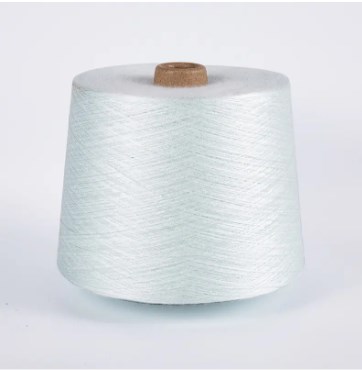1×7 Stainless Steel Wire Rope Product Introduction Overview: The 1×7 stainless steel wire rope is a high-quality, durable, and versatile wire rope constructed from a single strand of seven individual ...
See DetailsBasic Properties and Definition of Viscose Yarn
Viscose yarn is a key regenerated cellulose yarn in the textile industry. It is produced by chemically dissolving natural cellulose and then spinning it into yarn. Viscose yarn, with its softness, high gloss, and excellent moisture absorption, is widely used in clothing, home textiles, and industrial textiles. Compared to pure natural fibers, viscose yarn not only maintains the comfort of natural fibers but also exhibits unique advantages in strength, processability, and dyeability.
One of its notable characteristics is the soft feel of viscose yarn, resulting in a smooth and delicate texture suitable for next-to-skin wear. Its luster, similar to that of silk, gives the finished textile a premium feel. Its excellent moisture absorption and breathability ensure excellent breathability while maintaining comfort. These characteristics make viscose yarn an irreplaceable player in the modern textile industry.
Viscose Yarn Production Process and Technical Characteristics
The viscose yarn production process primarily involves raw material preparation, cellulose dissolution, spinning, washing, and stretching. The raw material is typically cotton linters or wood pulp, which is chemically dissolved to create a cellulose solution. This solution is then formed into continuous filament yarn through wet spinning or wet-dry spinning techniques. During the spinning process, controlling the draw ratio directly affects the strength and softness of the yarn, and the maturity of the technology determines the quality and stability of the final product.

During the spinning process, viscose yarn's linear density, torque, and twist must all be precisely controlled to ensure the feel and appearance of the finished fabric. Modern production processes can improve gloss, moisture absorption, and dyeing uniformity by adjusting spinning conditions while maintaining yarn strength. Due to its regenerated cellulose properties, viscose yarn has good dye affinity, resulting in vibrant colors that are resistant to fading, contributing to its popularity in fashion fabrics.
Viscose Yarn Applications and Market Trends
Viscose yarn is widely used in the modern textile industry. In the apparel industry, viscose yarn is commonly used in shirts, dresses, underwear, and high-end casual wear. Its soft, smooth feel and excellent moisture absorption and breathability provide a comfortable and natural wear experience. In the home textile sector, viscose yarn is suitable for bedding, curtains, and sofa fabrics, offering a soft, lustrous sheen and a luxurious feel. In industrial textiles, viscose yarn also finds specialized applications, such as medical gauze and filter materials, leveraging its hygroscopicity and chemical stability to meet specialized needs.
Market trends indicate that demand for viscose yarn continues to grow as consumers prioritize comfort and environmental friendliness. The sustainable nature of regenerated cellulose has drawn significant attention in green textiles, while innovative processes are driving the development of viscose yarn towards functionalization and high performance. Modern technology is also exploring ways to blend viscose yarn with other fibers to further enhance yarn performance and fabric application value.
Advantages of Viscose Yarn Dyeing and Post-Processing
Viscose yarn exhibits excellent compatibility during dyeing processes. Its regenerated cellulose structure allows for easy dye penetration, resulting in uniform, vibrant, and stable colors. Viscose yarn combines well with various dyes, including reactive, acid, and disperse dyes. Dyed fabrics boast rich colors while maintaining the yarn's inherent soft feel and gloss.
Viscose yarn also exhibits unique advantages in post-processing. Through heat treatment, setting, or sizing, the fabric's dimensional stability and abrasion resistance can be further enhanced. Specially treated viscose yarn can also enhance wrinkle resistance, shrinkage resistance, and anti-static properties, meeting the production requirements of high-end apparel and functional textiles. These processing capabilities provide textile companies with greater flexibility, enabling viscose yarn to be widely used in diverse markets.

The Value of Viscose Yarn in Sustainable Development
As the global textile industry moves towards environmentally friendly and sustainable development, viscose yarn, as a key representative of regenerated cellulose, has increasingly highlighted its environmental value. The raw materials used in its production process are renewable, and optimized processes can reduce chemical use and wastewater discharge. Compared to fully synthetic fibers, viscose yarn has a lower ecological impact and is more easily degradable at the end of its life, aligning with the concept of a circular economy.
Viscose yarn, with its natural fiber-like comfort, excellent luster and moisture absorption, as well as excellent dyeing and processing properties, has become a vital component of the modern textile industry. With the continuous optimization of production processes and the diversification of market demands, viscose yarn not only occupies a key position in the apparel and home textile sectors, but also shows broad application prospects in industrial textiles and functional fabrics. Against the backdrop of sustainable development, viscose yarn is using its unique advantages to drive the textile industry towards a high-quality, green, and intelligent future.
